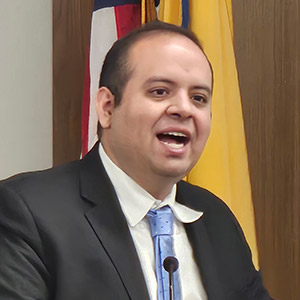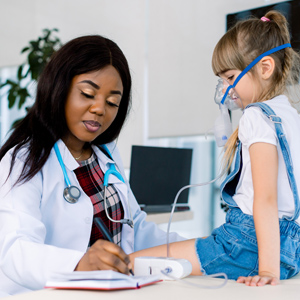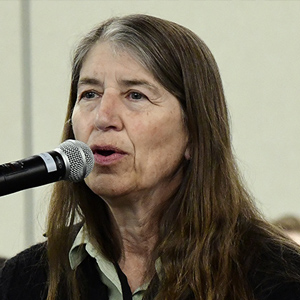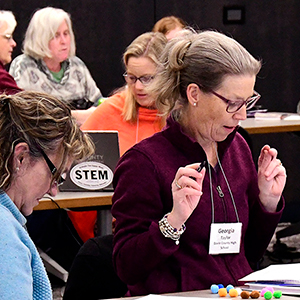
Nearly 800 women from across North Carolina gathered April 13 to celebrate the milestone 10th anniversary of the NIEHS Women’s Health Awareness (WHA) Wellness Conference. Held at Hillside High School in Durham and two satellite locations, more than three-dozen information sessions and panel discussions, 50 resource booths, and free health screenings, drew double the number of attendees this year compared with 2015.
To reach women living in urban and more rural locations in eastern and western portions of North Carolina, NIEHS partnered with groups in Granville, Vance, and Buncombe counties. WHA programming was livestreamed to sites in Creedmoor and Asheville, North Carolina. These sites also had free health screenings, in-person sessions, and resource booths.
“Women's health awareness is an evidence-based intervention,” said Joan Packenham, Ph.D., director of the NIEHS Office of Human Research and Community Engagement (OHRCE), and the WHA Program. “Over the past decade our goal has been to reduce health and environmental health disparities, build resilient communities, address environmental justice issues, and provide health equity.”
A diverse offering of topics

The program opened with posting of the colors by Hillside High School ROTC students and a celebratory message from Admiral Rachel Levine, M.D., the Assistant Secretary for Health at the U.S. Department of Health and Human Services (HHS). Greetings and welcome were given by Hillside High School Principal William T. Logan III, Ph.D., Durham Mayor Leonardo Williams, and NIEHS Director Rick Woychik, Ph.D., along with representatives for partner organizations, North Carolina Central University, and Delta Sigma Theta Sorority Inc. A broad program designed to educate and inform participants followed.
To address emerging health and environmental health concerns affecting the health and well-being of families and communities across the United States, federal and state level representatives were invited to present. The following representatives from HHS spoke about the following topics.
- Sharunda Buchanan, Ph.D., interim director of the HHS Office of Environmental Justice within the Office of Climate Change and Health Equity, discussed environmental justice challenges.
- Melanie Fontes Rainer, J.D., director, Office for Civil Rights, discussed women’s health and reproductive rights.
- Pattie Tucker, Dr.PH., RN, director, Office of Women's Health, Centers for Disease Control and Prevention Office of Health Equity, addressed period poverty, or the lack of education about and access to safe and clean menstruation products and sanitation facilities.
In addition, the N.C. Department of Health and Human Services shared efforts to address unmet needs in North Carolina communities through NC Medicaid.

Other sessions addressed chronic health conditions, such as cancer, diabetes, cardiovascular health, and thyroid disease, and offered solutions like plant-forward eating habits and yoga. More than a dozen health screenings — including free mammograms as well as hearing, diabetes, cardiovascular, dermatologic and other cancers, and mental health screenings — were offered.
To explore the wealth of activities and presentations offered, check out the conference program.
Highlighting the environment’s role in health
Environmental justice concerns headlined this year’s event, which included “Centering Equity to Eradicate Occupational Health Disparities” and a dedicated session on American Indian Women's Health titled “Transforming Trauma: The Path to Hope and Healing.”
The keynote session, titled “Enhancing Environmental Justice in North Carolina,” was moderated by Deborah Holt Noel, a senior producer at PBS North Carolina. Buchanan opened the session, which included panelists from nonprofits Robeson County Disaster Recovery Coalition Inc., and Southern Environmental Law Center, as well as the N.C. Department of Health and Human Services.
“The health of women throughout every life stage is an issue that demands our utmost attention,” Buchanan said. “As we strive for health equity for all, we must prioritize environmental justice, since health is impacted by environmental factors, such as exposure, socioeconomic factors, and racial disparities. Women's health and environmental factors are inextricably linked.”

What’s ahead for WHA
The wellness conference may last just one day, but the program continues throughout the year with educational sessions, newsletters, and clinical research. At the conference, attendees had the opportunity to enroll in clinical studies focused on the impact of COVID-19 on women’s health, the environmental impact of hormones, reproductive health, teenage menstrual health, and studies on how the environment and genes affect health.
The WHA Program also offers educational resources, including videos, webinars, and public health messages that people can access between conferences.
“The Women’s Health Awareness Program reaches hard-to-reach, underserved communities and provides innovative programming,” Packenham said. “We listen to the community to understand and address the community’s health and environmental health needs and priorities.”
(Susan Cosier is a contract writer for the NIEHS Office of Communications and Public Liaison.)















